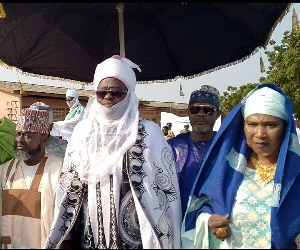The Greater Accra Zabarma Chief, who doubles as the President of the Council of Zabarma Chiefs, Sarki Musah Yahaya Yendu, marked the 3rd annual Zarmai Annaamai festival on Sunday, August 18, 2024, with a call on the Zabarmas to promote Zabarma culture and heritage as well as protect their rights as Zabarmas in Ghana.
The festival seeks to promote the Zabarma culture and tradition as well as bring together leaders of various ethnic and tribal chiefs, groups, and Muslim clergy, as well as members of the Muslim community in the country, under one umbrella.
The Zarmai Annaamai festival also welcomed dignitaries from the various political parties, Nigerians, and some special guests from Niger and other countries who gathered to celebrate the festival.
This follows their weeklong social activities such as a health walk, a football game, and a recitation of the Holy Qur'an, among others, marking this year’s Zarmai Annaamai Fesival on the theme "Promoting the Cultural and Heritage of the Zabarama: The Role of the Zabarama Communities in Ensuring a Peaceful 2024 General Election," which resonates with the principles of justice, equality, and inclusivity upon which the Zabarma tribe is built.
Addressing the gathering in a speech read on his behalf, the Greater Accra Zabarma Chief, Sarki Musah Yahaya Yendu, assured the people of his commitment and that of the Zarma Community to safeguarding the rights of all Zabarma's in Ghana and ensuring that the people live a life worth emulating by all and sundry.
The leadership of the Zabarma community, he said, will continue to work towards creating an inclusive and equitable society where every Zabarma in Ghana can thrive.
He expressed worries over how the Zabarma's in Ghana are being denied access to the requisite documents and requirements to prove their Ghanaian identity, a situation he said is hindering the Zabarma Community in Ghana, and therefore called on the government to engage the leadership of the Zabarma Community in Ghana for a lasting solution.
According to him, the Zabarmas will only know their rights and opportunities available to thrive in Ghana without any barriers, adding that preventing Zabarmas from acquiring the required documents or proof of citizenship to access Ghanaian Passport and other National Identification Cards are challenges and obstacles hindering the development of the Zarma Community in Ghana.
The Greater Accra Zabarma Chief encouraged participants to engage in thoughtful and constructive deliberations and explore ways to advance the legal rights and representation of the Zabarmas in Ghana, navigate the existing legal frameworks, and build strong networks to address the challenges facing the Zabarma community in areas of acquiring Ghanaian passports and other means of identification when they have all the necessary documents and requirements to prove their Ghanaian identity.
He urged all participants to work collaboratively to find solutions that will bridge the gaps and promote equal opportunities for all.
The Zabarma, he said, is a tribe that prides itself on its diversity and peaceful coexistence with various tribes and faiths and is committed to peaceful values and the protection of individual rights and liberties.
He added that the tribe cherishes freedom, which promotes harmony and co-existence with one another without discrimination, and it is their collective responsibility to uphold and protect these rights at all times.
The Zabarma community in Ghana, he said, has played a vital role in socio-cultural and economic development in Ghana and has contributed in the areas of security, transport and haulage, education, healthcare, agriculture, and community development, which have not gone unnoticed.
Sarki Musah Yahaya Yendu commended his people for their dedication to improving the lives of their fellow citizens and saluted their grandparents for being part of the struggle for Ghana’s independence.
He acknowledged the efforts of Zabarma prominent figures who have in diverse ways contributed to the socio-economic growth of Ghana, which include Alhaji Adamu Iddrisu of Global Haulage, Alhaji Hussain Maiga, Alhaji Mahamadu Maida, Chief Alhaji Tanko Nuhu, Chief Alhaji Halidou Jibril, and Ambassador Alhaji Abdul Salam Amadu of Afro-Arab Group of Company, among others.
The Greater Accra Zabarma Chief acknowledged the contribution of Obrenpong Kru Takyi II, the Omanhene of the Abease Traditional Authority, Queen Mother Obahemaa Abena Frimpomaa Kesee, and the entire community of the Abease Traditional Area for their tremendous support to the Zabarma community in Ghana by upholding a long historical bond that was established by their grandparents in Abease.
According to him, the Omanhene of Abease have maintained a long-term relationship between their great-grandfathers, Kobena Gija and the then Omanhene of Abease.
He said Kobina Gija, a Zabarma, first settled and married a native of Abease and was given a parcel of land to settle on, which is now called Zabarma on the map of Ghana.
The Accra Zabarma Chief revealed that Abrepong Kru Takyi II has added over 200 acres of land to be occupied and developed by the Zabarma people in Zabarma.
Sarki Musah Yahaya Yendu used the occasion to call on Zabarmas in Ghana to play a pivotal role in ensuring peace before, during, and after the upcoming general elections and warned those who are not eligible voters not to go to the polling station.
Regional News of Wednesday, 21 August 2024
Source: Muhammed Faisal Mustapha, Contributor

















